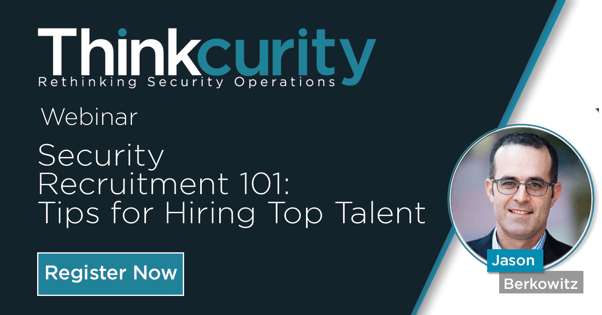Finding job candidates has never been easier as online job boards become more and more common. But finding the right job candidates is still a big challenge. 69% of private security company owners say hiring and retention is a challenge in their operation.
So how can you hire and retain better security guards and supervisors? The answer might be in your recruiting sources.
Even though online job boards are easy and popular, there are still many ways to recruit security professionals that might be better for your specific operation. This article will look at the top 3 recruiting sources in 2021 for the physical security industry and the pros and cons of each.
Most Popular Security Recruiting Sources 2020
The 2020 Physical Security Industry Benchmark Report asked security operations what they thought were the most effective sources for finding good job candidates. The 3 most popular answers - job boards, in-house HR teams, and referrals - made up almost 60% of all responses, with job boards (Indeed, Ziprecruiter, LinkedIn, etc.) being the next highest at 22%.*
*(Note: Guard firms with over 100 employees said they used Applicant Tracking Systems about as much as referrals.)
General Recruiting Best Practices
No matter what sources you use to recruit new employees for your physical security company, there are a few best practices you should keep in mind.
Strong culture - Having a strong company culture helps you identify what you’re looking for in job candidates, both in hard skills and soft skills.
Hire slow, fire fast - There is a temptation - even a need sometimes - in the physical security industry to hire as quickly as possible. But taking your time during the hiring process will limit mistakes and turnover.
Understand the hiring process - There are 6 phases to the hiring process: planning, sourcing, screening, selection, onboarding, and retention. Knowing these well will help you improve your hiring decisions every step of the way.
Want even more best practices on recruiting for your physical security company? Watch our security recruitment 101 webinar with Jason Berkowitz of Jobvite, an applicant tracking and recruiting software designed for the security industry.
Job Boards
Online job boards have replaced the once-popular classified ads and other types of job postings. There are dozens of job boards across the internet including LinkedIn, Monster, Indeed, and Ziprecruiter.
Pros
Job boards are popular - especially with smaller physical security companies - mainly because they are easy to use and basically cost no money. If you have a small team and do all of the recruiting and hiring on your own, job boards make a lot of sense. When it comes to going through endless resumes, job boards save you time by putting all of them in one centralized place.
This is the easiest way to get high levels of exposure to your open positions. If you need to fill a position quickly - that’s a really good thing. But, if you are looking for specific qualifications or serious candidates, this can be a bad thing.
Cons
High exposure means you will have a lot more people applying for the job. If you have too many applicants, you will end up eliminating the time savings that make job boards so appealing.
Compared to other recruiting sources, job boards will also be the hardest way to properly vet candidates. Resumes and/or cover letters will be the primary way of qualifying people, and they are not the most reliable or effective.
In order to better vet candidates through job boards, make sure you request contact information of security companies they’ve worked for in the past and personal references. If you are looking for a certain level of physical security experience, that can be another way to quickly eliminate large numbers of applicants.
In-House HR
In the benchmark survey, 19% of all the respondents said they used an in-house HR team for recruiting. What was surprising - 20% of security companies with under 100 employees used in-house HR.
If this is an option you’re considering, remember that you don’t need a full team for it to be effective. Having one back-office employee dedicated to recruiting, hiring, and onboarding can go a long way.
Pros
The most appealing part of having an in-house HR team to recruit is having a team that is dedicated to one of the most important parts of your business. The HR team (or employee) knows your company culture and can find security professionals they think will match it.
If you hire the right HR professional, you will have someone who has skills and experience to find the most qualified candidates. This will also save you time to focus on your security-specific expertise while not ignoring the attention recruiting and hiring needs.
Cons
Any amount of in-house HR employees will probably be more expensive than hiring a 3rd party, using software, or just doing it yourself. Physical security can be seasonal and many contracts are temporary. If work isn’t consistent enough, you might not be able to keep someone on payroll permanently.
Referrals
Recruiting through personal referrals from your existing security officers and supervisors has the potential to go really good or really bad. It all depends on the culture you have built for your security company.
Pros
With a strong company culture full of trustworthy employees, personal referrals are one of the best ways to get new qualified and committed security officers into your organization.
For your current guards, working with people they already know and get along with can make work more enjoyable. This can reduce no-shows and build comradery. If you set up incentives for successful referrals, employees will be able to take ownership in the company and help it grow and succeed.
For you, referrals can make recruiting work take little to no effort. Plus, it will help your hiring efforts down the road when you can tell people your security company is so great - your employees want their friends to work with them.
Cons
Referral recruiting can backfire if you aren’t careful. Again, they will only be successful when you trust your security officers and know they are bought into your company.
If your incentive system isn’t laid out carefully, some of your employees might take advantage of it. The result could be even higher turnover than before as employees refer every person they know for the money. It’s usually best to wait to give the employee the incentive until after the referral has been employed for a certain amount of time.
Successful referrals can boost employee morale and buy-in. But rejected referrals can have the exact opposite effect. There’s a good chance that not every employee referral will be a good fit for your security operation. If you have to reject one, it can easily decrease morale.
To prevent this, make sure you make it clear to your current security guards what minimum qualifications you are looking for in new hires. This will give you the best chance of having more qualified referrals.
Closing
Recruiting can be a complicated process, and even harder to get right. Knowing what sources are most effective for your company will give you the best chance for success.
For even more help, make sure you check out the Security Recruitment 101: Tips for Hiring Top Talent webinar on-demand.




